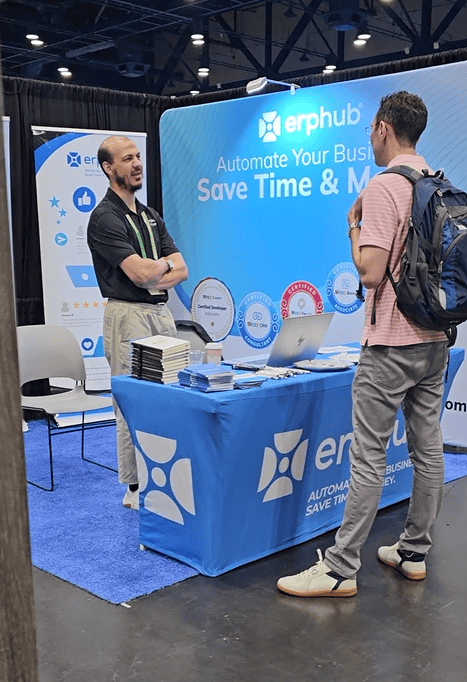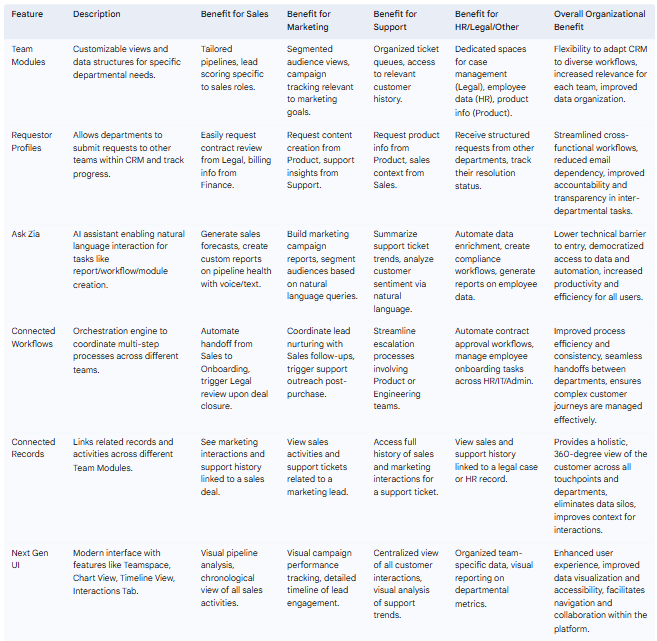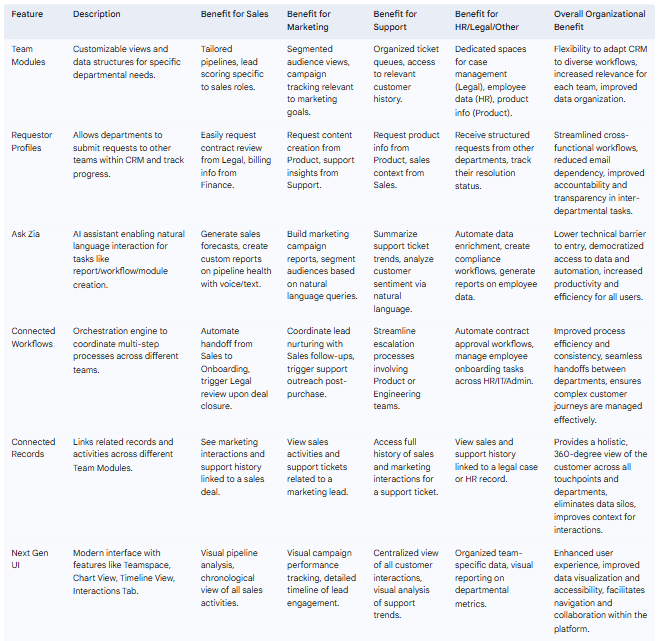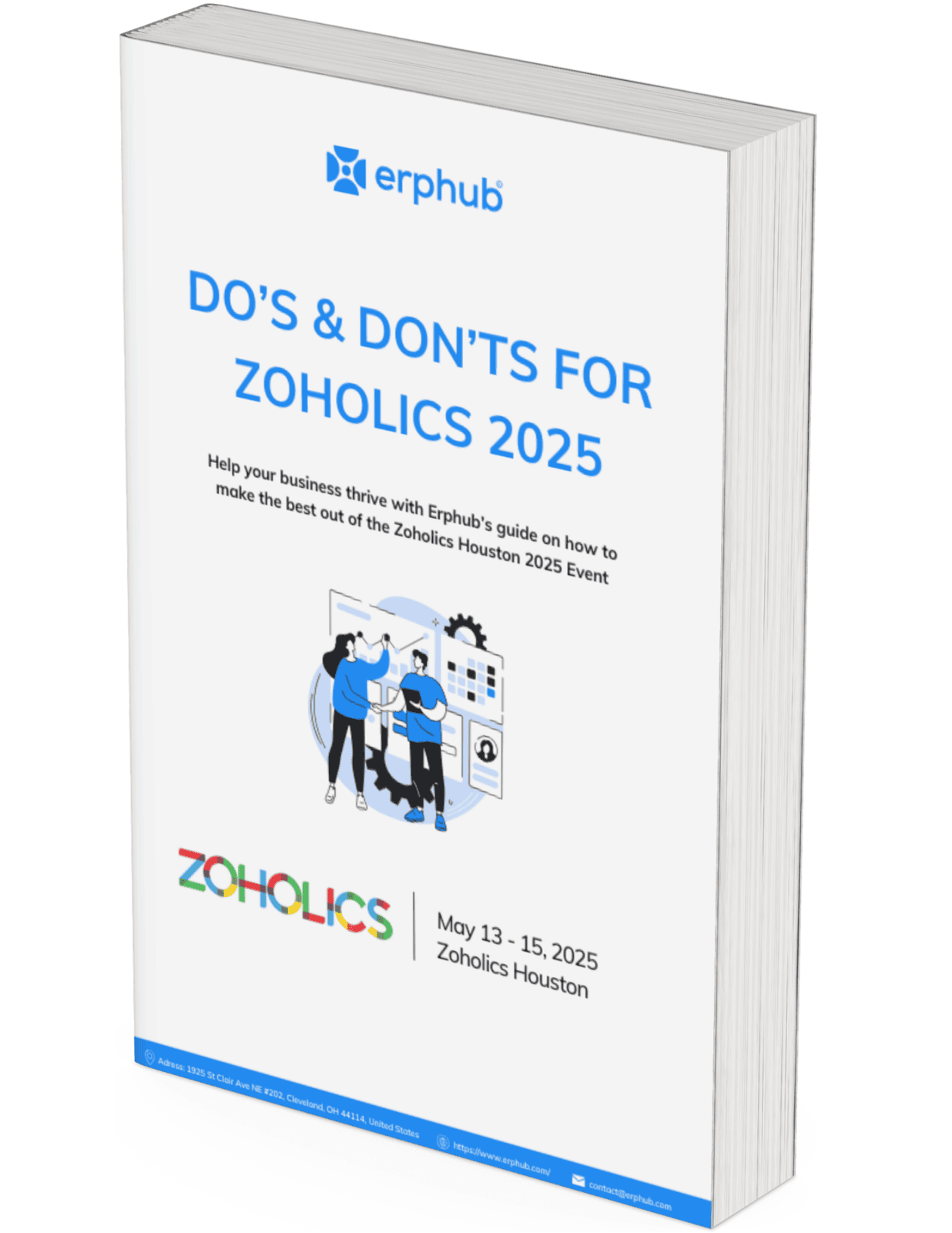
Zoholics USA 2025, held in Houston, Texas, served as a pivotal gathering for the Zoho ecosystem, showcasing the latest innovations poised to redefine business operations. Day 1, May 14th, was particularly significant, marked by keynotes from Zoho leadership and major product announcements that underscored a strategic vision centered on pervasive artificial intelligence (AI), intelligent automation, and the unification of customer operations across the entire enterprise. This report delves into the highlights of Day 1, exploring how Zoho's advancements in CRM, AI, automation, security, and financial solutions are empowering businesses to navigate the complexities of the digital era, enhance efficiency, and foster unprecedented growth. The analysis will explore the implications of these announcements in the context of broader industry trends and demonstrate the transformative potential of a unified, AI-powered platform.
Introduction: Setting the Stage at Zoholics Houston 2025
Zoholics stands as Zoho's premier annual user conference, a crucial event for its global community of users, partners, and industry thought leaders. It serves as a vibrant hub for learning, networking, and discovering new ways to leverage Zoho's technology for business success. The conference is about celebrating innovation, connection, and the community itself. The 2025 iteration held particular significance, taking place in Houston, Texas, from May 13th to 15th at the George R. Brown Convention Center. This location and timing positioned the event as a major North American focus for Zoho's strategic announcements and roadmap for the coming year.
The event structure included pre-event workshops on May 13th, providing focused, hands-on learning opportunities before the main conference commenced. Day 1, May 14th, marked the formal opening day of the main conference, which is typically reserved for the most significant strategic announcements and keynotes designed to set the tone for the event and capture the attention of attendees and the wider industry.
A clear and consistent theme emerged throughout the discussions and anticipated announcements surrounding Zoholics USA 2025: automation empowered by the intelligence of AI. This indicates a deliberate, company-wide strategic acceleration towards embedding AI deeply within the Zoho suite to make automation smarter, more effective, and applicable across an even wider range of business processes. This fundamental technological driver forms the foundation for many of the expected product enhancements and is poised to redefine how businesses leverage the Zoho platform. This report will focus specifically on the key takeaways and announcements from this impactful first day, exploring how Zoho is leveraging AI and automation to drive business transformation.
Day 1 Keynotes: Charting the Course for the AI-Powered Enterprise
Day 1 of Zoholics USA 2025, May 14th, formally began with registration and breakfast, leading into the highly anticipated Common Session Keynotes. These opening keynotes are typically delivered by prominent figures from Zoho's leadership team, including executives and product heads. The primary objective of these sessions is to articulate Zoho's overarching vision for the future of business technology, provide insights into the company's strategic direction, and unveil the key themes that will dominate the conference.
A significant focus of the 2025 keynotes was anticipated to be on how Zoho is actively shaping the future of business technology through AI-driven advancements. Discussions were expected to cover innovation, customer success, and the roadmap ahead, with a particular emphasis on how Zoho's AI is transforming business efficiency, decision-making, and automation to help businesses stay ahead in an ever-changing digital landscape. The mention of 'Agentic AI at Zoho' in the Day 2 closing common session title further reinforced that advanced AI capabilities were a high-level, strategic focus for the company throughout the event. Agentic AI refers to systems and programs that can perform a variety of functions autonomously, acting on behalf of users and automating tasks that go beyond simple data processing. This suggests that Zoho is focusing on integrating more intelligent, self-directed capabilities into its platform, moving beyond traditional automation to enable more sophisticated, autonomous workflows.
The keynotes likely served to frame the subsequent product announcements and breakout sessions as concrete manifestations of this AI-powered, unified vision. By starting with the strategic "why" – the transformative potential of AI and automation for business efficiency and decision-making – the keynotes provided a crucial backdrop for understanding the significance of the specific product details revealed later in the day. This deliberate narrative structure, moving from high-level vision to specific solutions, is designed to build a comprehensive picture of Zoho's strategy and the value it aims to deliver to its customers. The keynotes set the stage for a day packed with insights into how Zoho's integrated platform, infused with AI, is poised to drive significant advancements in business operations.

Major Announcements from Day 1 (May 14th): Deep Dive
Day 1 of Zoholics USA 2025 was marked by several significant product announcements that underscored Zoho's strategic direction. These unveilings provided attendees with a clear view of the platform's evolution and its increasing capabilities in key areas like customer operations, security, and finance.
Zoho CRM for Everyone: Breaking Down Silos for Unified Customer Operations
A headline announcement on Day 1 was the general availability of Zoho CRM for Everyone. This offering represents a significant strategic shift for Zoho, extending traditional CRM capabilities beyond sales and marketing teams to encompass all customer-centric departments within an organization, including HR, Legal, Finance, Support, and Product teams, among others. The core purpose of this initiative is to break down departmental silos and create a truly unified view of the customer across the entire enterprise.
The strategic importance of this move lies in addressing the pervasive challenge of fragmented data and lack of cross-functional visibility that often hinders effective digital transformation efforts. Traditional CRM systems are frequently perceived as tools solely for sales and marketing. However, successful digital transformation necessitates integrating data and processes across the organization to deliver seamless customer experiences and improve operational efficiency. By explicitly integrating departments like HR, Legal, and Product into the CRM ecosystem, Zoho is positioning CRM as the central nervous system for all customer-related interactions and processes, fostering better collaboration and ensuring the customer remains at the heart of organizational decision-making.
Zoho CRM for Everyone introduces several core features designed to facilitate this unified approach. Team Modules allow different departments to customize their own view of CRM data, create alerts, and run automations specific to their workflows. Requestor Profiles, accessible via Team Modules, enable one department to submit a request to another and track its progress directly within the CRM, streamlining cross-team workflows and reducing reliance on email. The offering also includes a Next Gen UI with features like Sidebar, Teamspace, Chart View, Grid View, Timeline View, Interactions Tab, and Dark Mode, designed for improved navigation and collaboration. Connected Workflows provide an orchestration engine to coordinate work across various teams involved in delivering customer experiences, while Connected Records link work as it travels between Team Modules, ensuring context is maintained throughout the customer journey.
A key component of Zoho CRM for Everyone is the deep integration of AI through Ask Zia. This native virtual assistant allows users to create reports, custom modules, and workflows, and even customize Team Modules using natural language prompts. This AI capability is crucial for driving adoption beyond tech-savvy users and democratizing access to customer data and automation. Zia's advanced capabilities, including data enrichment, productivity boosts, improved data quality, and enhanced customer engagement, help to lower the technical barrier to entry, empowering users across departments to leverage the CRM effectively. This simplified interaction leads to increased adoption and empowerment, crucial for realizing the value of extending CRM to non-traditional users and aligns with the broader trend of AI enabling more intuitive technology interaction.
The availability of Zoho CRM for Everyone starts from $9 per user, per month across paid editions of Zoho CRM. The offering includes various limits on features like Teamspace creation and module/field counts depending on the edition (Standard, Professional, Enterprise, Ultimate/CRMPlus/Zoho One), with Zoho One with the Ultimate Add-on being equivalent to the CRM Ultimate edition limits.
The "Connected Workflows" and "Connected Records" features highlight a focus on process orchestration and maintaining context across departments. It is not enough for teams to merely view data from other departments; they must be able to act on it and understand the history of interactions. Connected Workflows provide the necessary orchestration layer for complex, multi-departmental customer processes. Connected Records ensure that as a customer interaction or task moves between teams (e.g., from Sales to Legal for contract review, then to Finance for billing), the complete context is preserved. This directly addresses common challenges in cross-departmental work, such as process delays and accountability issues , and is essential for delivering seamless and consistent customer experiences.
Zoho CRM for Everyone represents a significant step towards a unified customer operations model, leveraging AI and intelligent features to make customer data and workflows accessible and actionable across the entire organization.


Another significant announcement on Day 1 of Zoholics USA 2025 was the launch of Ulaa Enterprise, Zoho's privacy-focused web browser tailored for business use. This move signals Zoho's recognition that security and data privacy are paramount in the digital workplace and need to be addressed comprehensively, including at the endpoint level.
In today's environment of increased cloud adoption, widespread remote and hybrid work models, and the growing sophistication of cyber threats, the web browser has become a critical attack surface and a potential point of data leakage. Traditional security measures often focus on network perimeters or application-level controls. However, with employees accessing sensitive business data through browsers on various devices and networks, security at the endpoint is increasingly vital. Zoho's decision to offer a managed, secure browser directly addresses this challenge by embedding robust security features at the browser layer.
Ulaa Enterprise is designed to prevent threats at the browser level while balancing potent security, ease-of-use, and extensive control features. It offers a mix of administrative capabilities, including comprehensive policy management, extension management, and bookmark management. IT administrators can access controls to restrict downloads, manage extensions, and govern user behavior through central policies applied across users and groups. A core feature is proactive data loss prevention built directly into the browser layer, preventing unauthorized uploads, copy-paste actions, screen captures, and downloads of sensitive data. It can also block camera and microphone use to prevent eavesdropping or covert surveillance. Machine learning-powered phishing detection is also included to enhance security.
The browser also incorporates AI features, with Zia helping to organize tabs based on user behavior and offering a natural language interface for browser management tasks. This hints at using AI not only for security but also for enhancing user productivity within the secure environment, demonstrating a multi-dimensional approach to the browser as a tool for both protection and work facilitation.
Zoho highlights several key benefits for Ulaa Enterprise, including low IT overhead due to its lack of heavy virtualization or complex infrastructure requirements, and intelligent monitoring that supports ethical, targeted security without becoming invasive surveillance. The launch of Ulaa Enterprise as the front-end to business applications positions it as a crucial component of Zoho's security stack, which the company emphasizes as part of its DNA and unique in the industry. This move provides businesses with a tool to enhance endpoint security and simplify the complexity of managing security and productivity across a distributed workforce.
Zoho Payments US Launch: Streamlining Financial Transactions
Day 1 also saw the announcement of the availability of Zoho Payments in the United States. Zoho Payments is presented as a unified payment solution designed to help businesses collect payments online using multiple payment methods, including cards and ACH.
The strategic importance of launching Zoho Payments in the US lies in enhancing the stickiness and value proposition of the entire Zoho ecosystem, particularly for US-based businesses that rely heavily on Zoho's finance, sales, and operations tools. Payments are a critical and often complex part of the business workflow, especially for managing revenue and cash flow. By offering a native payment solution, Zoho reduces the need for businesses to rely solely on third-party payment gateways, which can involve separate integrations, fees, and management overhead.
The key advantage highlighted is its native integration with the broader Zoho suite. Zoho Payments works out-of-the-box with Zoho's applications across finance and operations, sales and marketing, low-code, and collaboration platforms. This deep, out-of-the-box integration allows businesses to manage payments directly within their existing Zoho workflows, simplifying payment collection and management, reducing friction, and keeping more of the business process within the unified Zoho environment. This integrated approach simplifies workflows and potentially reduces costs and complexity compared to managing separate payment systems.
The emphasis on integration with a wide range of Zoho apps demonstrates that Zoho views payments not merely as a finance function but as a critical touchpoint across the entire customer and business lifecycle. Payments data is relevant beyond just accounting; sales teams need to track payment status, marketing might use payment history for segmentation, operations need payment confirmation for order fulfillment, and custom applications might need to trigger actions based on payment events. The broad integration allows payment data to feed into a more holistic view of the customer and the business, supporting data-driven decision-making and enabling smoother cross-functional processes, aligning with the overall themes of unification and transformation highlighted throughout Day 1. While offering native capabilities, Zoho Payments also provides the ability to connect to any third-party systems via APIs, ensuring flexibility for businesses with existing infrastructure or specific integration needs.


A major trend highlighted for 2025 is the rise of Agentic AI. This refers to systems and programs that can perform a variety of functions autonomously, acting on behalf of employees while they focus on other work. Agentic AI can automate decision-making, problem-solving, and tasks that go beyond the data the system was initially trained on. The potential for AI agents to operate autonomously, adapt to dynamic environments, and be proactive represents the next frontier in automation, significantly reducing the need for constant human oversight.
Zoho's AI strategy is centered around Zia, its in-house AI assistant. Zia's capabilities extend beyond simple automation; she can predict customer behavior, score leads based on likelihood to convert, detect anomalies in data, and make data-driven suggestions. Zia supports natural language processing, allowing users to interact with Zoho applications conversationally. The emphasis on "Agentic AI at Zoho" suggests that the company is actively developing Zia and other AI components to move towards these more sophisticated, autonomous capabilities, enhancing workflow automation and decision support across the suite.
AI and automation are being applied across numerous Zoho solutions, creating smarter, faster, and more effective workflows:
- CRM: AI is integrated for smarter client acquisition strategies, enhancing dashboard customization with real-time filters, improving sales forecasting accuracy by allowing customization of included users, enriching accounts with external data, blocking spam calls, and automatically enriching data for Leads, Contacts, and Accounts via Zia. AI-powered features also include lead scoring, predicting customer needs, automating follow-ups, and suggesting next best actions. Automation handles repetitive tasks and updates records.
- Marketing: Zoho's marketing tools (Campaigns, Social) allow businesses to automate the entire marketing lifecycle, delivering personalized and targeted messages. AI and smart automation enable personalized, data-driven customer experiences and impactful campaigns. Generative AI is noted as a trend in content creation and personalization , while predictive AI is used for customer insights and targeting.
- Finance: Zoho's unified finance suite includes AI-powered financial forecasting to anticipate cash flow trends and automated tax compliance tools.
- Operations: Automation streamlines operations and enhances decision-making. AI automates repetitive tasks, improving productivity across teams. Industry trends include predictive maintenance and demand forecasting leveraging AI.
- Collaboration: Zoho's collaboration tools (Cliq, Projects, WorkDrive) automate task assignments, sync project updates, and facilitate file sharing. AI-powered chat insights are available in Cliq , and AI can summarize discussions and provide real-time transcription in meetings.
- BI & Analytics: AI-powered analytics functionalities are key to unlocking the power of business data and creating insightful reports and dashboards. Predictive analytics is a major application, forecasting trends and outcomes based on historical data. Real-time analytics and performance metrics are accessible across the platform.
- Developer Tools (Creator, Flow): These low-code/no-code platforms enable businesses to automate workflows and build custom applications , with AI integrations further enhancing their capabilities.
- Security (Ulaa): The new Ulaa Enterprise browser includes ML-powered phishing detection and uses AI for tasks like tab organization. AI-enabled security is also noted as a way to optimize robust security measures in IoT platforms.
Zoho's integration of AI aligns with major industry trends reported by leading firms, suggesting a strategic commitment to embedding AI deeply across its entire platform rather than offering isolated AI tools. Snippets from Deloitte, McKinsey, Forrester, IBM, Stanford, and the World Economic Forum consistently highlight AI as a top business and technology trend for 2025, driving productivity, innovation, and transformation. Zoho's emphasis on AI and automation "empowered by the intelligence of AI" and the specific examples across numerous apps demonstrate that Zoho is not just reacting to the trend but actively embedding AI (Zia, Agentic AI) as a core component of its platform strategy. This deep integration across the suite is a key differentiator compared to single-point solutions.
The focus on Agentic AI within Zoho indicates a move towards more sophisticated, autonomous capabilities that can significantly enhance workflow automation and decision support beyond simple rule-based automation. Agentic AI systems can perform functions autonomously and make decisions , a step beyond merely automating repetitive tasks. Agentic AI could potentially handle complex tasks like orchestrating marketing campaigns or simulating product launches. While Zia already offers predictive insights and suggestions , the emphasis on "Agentic AI at Zoho" suggests future capabilities where Zoho's AI might proactively initiate and manage multi-step processes across applications without constant human oversight. This progression towards agentic capabilities promises higher levels of automation and efficiency, representing a significant step forward in business software.
Furthermore, Zoho is leveraging AI not only for direct business functions like sales, marketing, and finance but also for underlying platform capabilities such as security (Ulaa) and data management (Zia data enrichment). Using ML for phishing detection in Ulaa or Zia for automatic data enrichment in CRM demonstrates AI's role in strengthening the platform's core functionalities. This multi-dimensional application of AI builds a more intelligent and secure foundation, which is critical for enterprise adoption and addressing concerns around data quality and security.
Key Announcements from Zoholics USA 2025 Day 1 (May 14th)

Day 1 Takeaways and the Path Forward
Day 1 of Zoholics USA 2025 in Houston delivered a clear and compelling vision for the future of business technology, centered firmly on the transformative power of AI and automation integrated across a unified platform. The keynotes set the stage by highlighting Zoho's strategic commitment to embedding AI deeply into its suite, positioning it as a fundamental layer for driving efficiency and enhancing decision-making.
The major announcements from May 14th provided concrete examples of this strategy in action. The general availability of Zoho CRM for Everyone marked a significant step towards breaking down departmental silos and unifying customer operations across the entire enterprise, enabling better collaboration and a holistic view of the customer. The launch of Ulaa Enterprise demonstrated Zoho's focus on securing the digital workplace at the endpoint, addressing critical concerns around data privacy and IT management in distributed environments. The availability of Zoho Payments in the US streamlined financial transactions by integrating payment collection natively within the Zoho ecosystem.
These announcements, coupled with the pervasive emphasis on AI and automation across various solution tracks (CRM, Marketing, Finance, Operations, BI/Analytics, Collaboration), signaled Zoho's intent to move beyond being a provider of a suite of business applications to becoming the foundational "Operating System for Business" , with AI and unified data at its core. The combination of extending CRM to all departments, enhancing underlying security, and integrating core functions like payments natively, all powered by pervasive AI (Zia, Agentic AI), paints a picture of a platform aiming to manage and orchestrate nearly every aspect of a business. This strategic positioning is a direct response to the complexity and fragmentation businesses face with disparate systems and aligns with the need for a cohesive approach to digital transformation.
The focus on both high-level AI strategy, such as the discussions around Agentic AI, and granular feature enhancements across various applications indicated a mature product development approach that balances an ambitious future vision with practical, immediate improvements for users. Announcing both cutting-edge concepts like Agentic AI and tangible, usability-focused features shows Zoho is addressing different levels of user needs and technological maturity. This balanced approach makes the platform appealing to businesses looking for both immediate productivity gains and a clear path towards future innovation, building confidence that Zoho's AI vision is grounded in practical application and user value.
Day 1 of Zoholics USA 2025 showcased Zoho's commitment to providing businesses with the tools needed to navigate the complexities of the digital era, enhance efficiency through intelligent automation, and foster unprecedented growth through a unified, data-driven approach. The event underscored that successful business transformation in 2025 and beyond will heavily rely on leveraging integrated platforms infused with advanced AI capabilities to break down silos, empower teams, and deliver seamless customer experiences. The insights gained from Day 1 offer a clear roadmap for businesses seeking to harness the full potential of the Zoho ecosystem.

